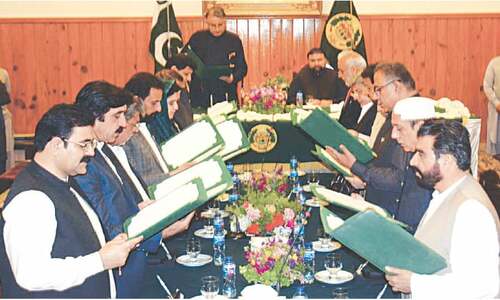IN a technical assessment of Punjab’s agricultural sector, the World Bank says the growth is held back by the pattern of public spending characterised by subsidies rather than investments to lower the high production costs undermining the competitiveness.
Last month, the World Bank approved a loan of $300 million for strengthening markets and rural transformation project to modernise the sector and raise farmers’ incomes, give consumers better-quality and safer food at lower prices, create jobs on farms and agribusinesses, and improve the use of irrigation water.
After achieving the food security the policies, investments and institutional arrangements have to be adjusted to changing circumstances such as significant changes in consumer demand away from traditional staple crops towards high-value commodities, especially horticulture and livestock.
The negative consequences of low yields extend from low farmer incomes to large tracts of land locked up in low-value agriculture
The changing consumption trends are evident not only among higher-income households, but also in poorer ones. The current interventions by the Punjab government discourage private investment and limit competition for high-value commodities, including horticulture and livestock products of meat and milk. They also encourage excessive production of low-value commodities through unsustainable agricultural practices.
The sector needs a paradigm shift to unlock future opportunities for growth. The negative consequences of low yields extend from low farmer incomes to large tracts of land locked up in low-value agriculture.
There is a high potential pay-off associated with re-allocating public expenditures and policies towards investments with a focus on reforms in wheat, irrigation, fertiliser subsidies, and marketing to improve service delivery, agricultural research and development, agricultural insurance and climate-smart agriculture.
To this end, the Punjab government has decided to frame an agricultural policy. It has set up an agricultural commission with participation of farmers, officials of agricultural departments and academics.
Under the commission a number of sub-committees are working on reform in the marketing law and review of the research system.
A spokesperson for the agricultural department told Dawn that the draft policy will be discussed later this month. This will be the first comprehensive agricultural policy of the province since the devolution of agriculture to provinces.
With World Bank’s technical assistance, the provincial government has planned various initiatives to focus on a more market-oriented development paradigm with key legislation aimed at liberalising outputs and inputs markets.
The target would be to gradually phase out the wheat procurement programme and make subsidies exclusive for small farmers, focus on spending on technology innovation, high-value agriculture, preventive animal health care, crop insurance and promoting value addition and agro-business.
The Punjab government believes these changes will not put any further fiscal burden on the government and enhance effectiveness of public resources.
For improving regulatory framework, the creation of a provincial seed inspection service was on the cards. The World Bank has advised amendments in the Federal Seed Act of 2015. Since seed legislation is a federal subject, the bank was not in a position to support a provincial seed act.
The World Bank has also suggested reforms in the public agricultural research and the extension system in Punjab. Research funding accounts for only 0.2 per cent of the agricultural GDP. More critically, there is a lack of strategy and direction in setting research priorities, cooperation across provinces, internationally and with the private sector, and managing and incentivising staff.
The Punjab Agricultural Research Board is in need of a revised mandate and restructuring. A World Bank-supported review of agriculture research and extension in Punjab started in August 2017 with financial support from the Australian government, and a final report is expected in a few weeks.
The domestic wheat price in Pakistan is driven by the government’s wheat procurement programme that procures wheat at 40-60pc above the world market price. This has led to a consistent domestic surplus of wheat and inhibits the diversification of production into high-value crops.
The procurement programme involves substantial losses, particularly excess stocks on which the government incurs operational and financial costs.
It penalises the sector’s growth trajectory as it encourages cultivation of wheat, a product in which Pakistan has no international competitive advantage and for which domestic demand is declining. Moreover, it discourages cultivation and supply chain development of fruits and vegetables whose demand is growing rapidly, both within and outside the country, and for which the China-Pakistan Economic Corridor will provide additional opportunities.
Published in Dawn, The Business and Finance Weekly, January 22nd, 2018














































Dear visitor, the comments section is undergoing an overhaul and will return soon.